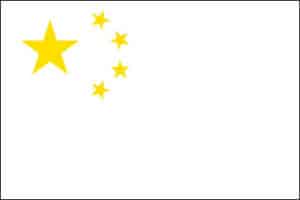
China Flag Description (China Flag Colors)
Red is a classic communist color that symbolizes the Communist revolution. The stars stand for the Chinese people, who are under the nation’s centralized government. The four smaller stars stand in for China’s four socioeconomic classes, while the greater star symbolizes the Communist Party. These social groups include the bourgeoisie, peasants, urban petit bourgeoisie, and the working class. “W Xng Hóng Q,” which translates to “Five-star Red Flag,” is the name of the flag. The five major ethnic groups that makeup China are Han, Manchu, Mongol, Hui, and Tibetans. This is another interpretation of the stars’ symbolism.
Fact about China flag |
|---|
| Country | China |
|---|---|
| Designed by | Zeng Liansong |
| Adopted | September 27, 1949 |
| Revision | NA |
| Design and Colors | A large golden star within an arc of four smaller golden stars, in the canton, on a field of red. |
| Size Ratio | 2:3 |
| National symbol(s): | dragon, giant panda |
| National colors: | red, yellow |
| National anthem: | |
| Name: | “Yiyongjun Jinxingqu” (The March of the Volunteers) |
| Lyrics/Music: | TIAN Han/NIE Er |
History of the Flag of China
On July 4, 1949, a commission of the Chinese government asked the populace for ideas for the national flag. There were almost 3,000 submitted drawings, which were then reduced to 38 and subjected to a committee debate. One submission, made by Shanghai’s Zeng Liansong, resembled the present flag. He created it while thinking about the Chinese saying, “Longing for the stars, longing for the moon.” With the huge star, Liansong included the communist party in the design of the flag.
A hammer and sickle were taken out of the huge star in Zeng Liansong’s flag design, which was then formally chosen by the committee on September 27, 1949, with a unanimous vote.

